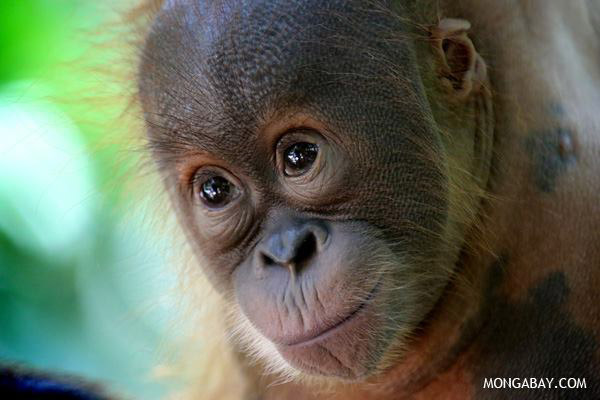
Orangutan in Sumatra. Photo by: Rhett A. Butler.
Next week, the rainforests of Southeast Asia are going live. On June 2nd, 11 organizations in the region will be posting lives video, photos, and wildlife sightings over 24 hours on Facebook and Twitter (see #rainforestlive). Dubbed Rainforest: Live, the initiative hopes to raise awareness of quickly vanishing ecosystems and species.
“So often coverage of rainforests focuses on the threats to jungles and wildlife. Amid stories about palm oil, deforestation, logging and poaching, it’s easy to forget the beauty and wonders of these forests,” said Matt Williams, Communications Manager for the Orangutan Tropical Peatland Project, which is spearheading the project. “If people in Southeast Asia and across the world are reminded of this incredible natural gift, then we have a better chance of saving tropical rainforests everywhere.”
No-where in the world are rainforests falling faster than in Southeast Asia. According to the Global Forest Watch, Malaysia has the world’s highest deforestation rate from 2000-2012, having lost over 14 percent of its forest during a dozen years. Indonesia is third, wand Cambodia comes in fifth.
Moreover in 2010, Conservation International rated the forests of mainland Southeast Asia (the Indo-Burma region) as the world’s most imperiled. The forests of Malaysia and Indonesia (Sundaland) were the third most threatened after New Caledonia.
“Rainforests in Sumatra and Borneo are home to the entire remaining world population of around 60,500 orangutans, which is rapidly disappearing. But it’s not just about the charismatic creatures we see in the headlines every day,” added Williams. “From fish, to birds, to frogs to butterflies, rainforests like Sabangau where OuTrop works are packed full of life.”
Southeast Asia also stands as one of the global hotspots for endangered species. According to the IUCN, there are 154 vertebrates currently listed as Critically Endangered in the region. In addition to habitat loss, many species are imperiled by the illegal wildlife trade.
“Rainforest: Live is an unprecedented event bringing live sightings straight from the jungle, and it’s very exciting that we’ll be leveraging the power of social media to bring people right into the heart of the jungle with us,” said Williams.

Organization involved in Rainforest:Live
- The Orangutan Tropical Peatland Project
- Gunung Palung Orangutan Project/Yayasan Palung
- Orangutan Land Trust
- Orangutan Foundation UK
- HUTAN Kinabatangan Orang-utan Conservation Program
- Selamatkan Yaki
- Sumatran Orangutan Conservation Program
- Integrated Conservation
- Burung Indonesia
- Harapan Rainforest
- Integrated Conservation
- Royal Society for the Protection of Birds
Related articles
Indonesia’s haze from forest fires kills 110,000 people per year

(05/28/2014) Haze caused by burning peat forests in Indonesia kills an average of 110,000 people per year and up to 300,000 during el Niño events, while releasing hundreds of millions of tons of greenhouse gases into the atmosphere, warns a new report from Greenpeace. Sumatra: Going up in smoke argues that peatland and forest protection are the best way to protect the region from the effects of haze.
Brunei to limit agricultural land use to 1 percent
(05/25/2014) The tiny, but densely forested country of Brunei Darussalam says it will limit agricultural conversion to one percent of its land mass, preserving much of the rest for biodiversity and other services afforded by healthy forest ecosystems.
Indonesia’s forests increasingly empty of wildlife
(05/25/2014) Tropical rainforests are the most species-rich ecosystems in the world. Each square kilometer has hundreds of tree species, birds and mammals, and countless other creatures. The idea that these forests could be devoid of animal life therefore seems ludicrous. Still the disappearance of birds, mammals and other species is what is happening in Indonesian forests. The ’empty forest’ syndrome is becoming an increasing reality in this country.
When the orangutan and the slow loris met – and no one was eaten

(05/05/2014) In 2004 and 2012, scientists recorded rare encounters between two very different primates: southern Bornean orangutans (Pongo pygmaeus wurmbii) and Philippine slow loris (Nycticebus menagensis). But in neither case did the Bornean orangutan appear to attempt to kill the slow loris for consumption, which Sumatran orangutans are known to do, albeit very rarely.
The Harry Potter wasp: public votes to name new species after soul-sucking ghouls

(05/05/2014) Whether a die-hard Harry Potter fan or not, you probably know what dementors are. They were the guards of Azkaban —dark hooded evil beings that sucked the soul out of their victims, leaving them alive but ’empty-shelled.’ These fictional creatures now share their name with a new species of cockroach wasp, insects that turn cockroaches into zombies.
Indonesian activist wins Goldman Prize for fighting palm oil, deforestation

(04/28/2014) An Indonesian has won the world’s most prestigious award for environmental activism for his efforts to fight illegal logging, forest encroachment for palm oil production, and a policy that would open up vast swathes of an endangered ecosystem for mining and industrial plantations.
APRIL continued destroying high conservation rainforest up until January pledge

(04/21/2014) Plantation giant Asia Pacific Resources International Limited (APRIL) continued to source fiber produced by destruction of high conservation value forests in Sumatra right up until it committed to a new forest conservation policy, according to an investigation by Eyes of the Forest, a coalition of environmental groups in Riau.
New relative of the ‘penis snake’ discovered in Myanmar

(04/17/2014) Scientists have discovered a new species of limbless amphibians, known as caecilians, in Myanmar. Dubbing the species, the colorful ichthyophis (Ichthyophis multicolor), the researchers describe the new amphibian in a recent paper published in Zootaxa. The world’s most famous caecilian is the so-called penis snake (Atretochoana eiselti) which was rediscovered in Brazil in 2011.
Malaysia at risk of falling behind in push for more sustainable palm oil

(04/17/2014) The Malaysian state should play a more active role in supporting the transition toward less environmentally destructive palm oil production, says a coalition of Malaysian NGO’s. In a statement issued Sunday, the Malaysian Palm Oil NGO Coalition (MPONGOC) urged Malaysian banks, palm oil associations, and other government-backed institutions to commit to ‘improving social and environmental standards in the palm oil industry’.
Malaysia imperils forest reserves and sea turtle nesting ground for industrial site (photos)

(04/15/2014) Plans for an industrial site threaten one of Malaysia’s only marine turtle nesting beaches and a forest home to rare trees and mammals, according to local activists. Recently, the state government of Perak approved two industrial project inside Tanjung Hantu Permanent Forest Reserve. But activists say these will not only cut into the reserve, but also scare away nesting turtles from Pasir Panjang.
Giant ibis, little dodo, and the kakapo: meet the 100 weirdest and most endangered birds

(04/10/2014) The comic dodo, the stately great auk, the passenger pigeon blotting out the skies: human kind has wiped out nearly 200 species of birds in the last five hundred years. Now, if we don’t act soon we’ll add many new ones to the list: birds such as the giant ibis, the plains-wanderer, and the crow honeyeater. And these are just a few of the species that appear today on the long-awaited EDGE list.
Just how bad is the logging crisis in Myanmar? 72 percent of exports illegal

(03/26/2014) Just days before Myanmar, also known as Burma, implements a ban on exporting raw logs, the Environmental Investigative Agency (EIA) has released a new report that captures the sheer scale of the country’s illegal logging crisis. According to the EIA, new data shows that 72 percent of logs exported from Myanmar between 2000-2013 were illegally harvested.